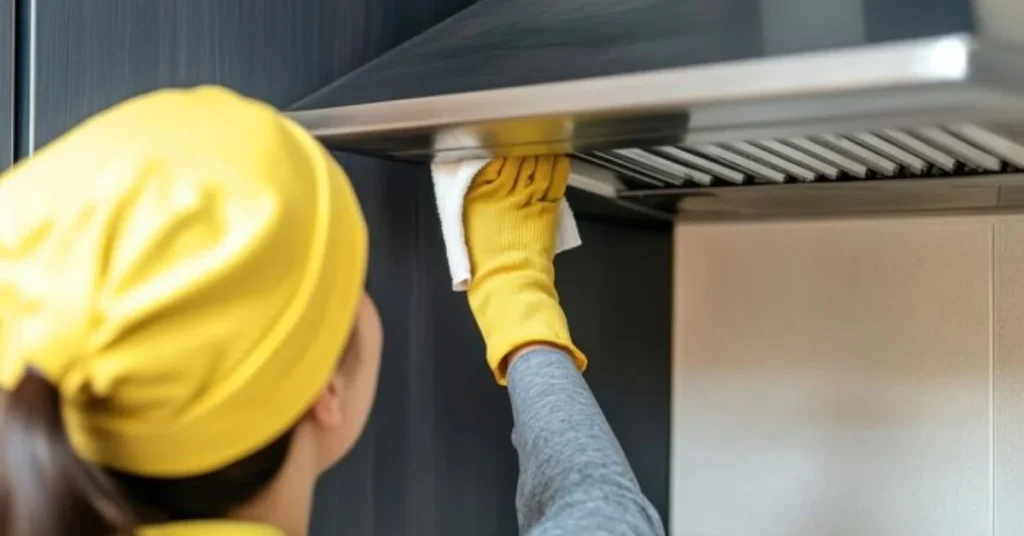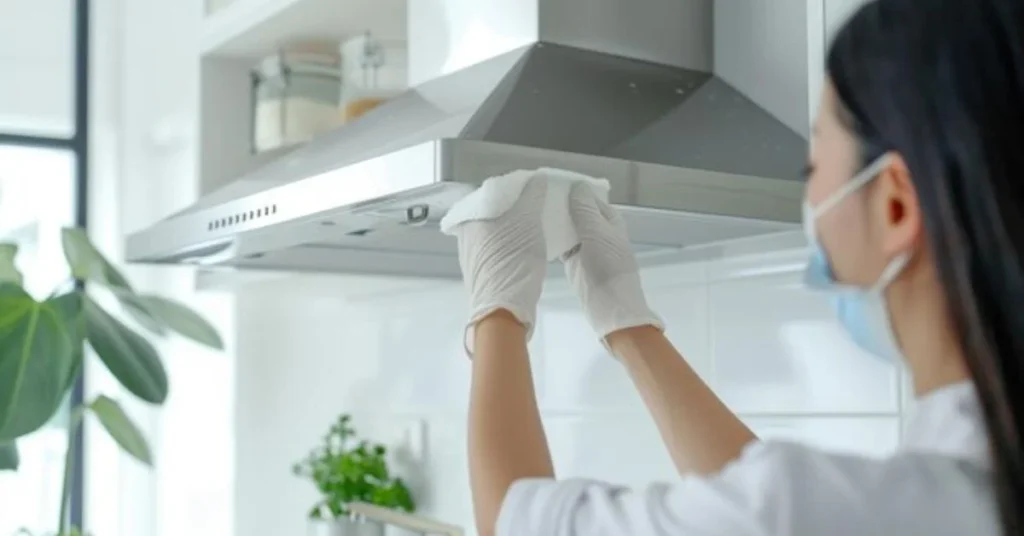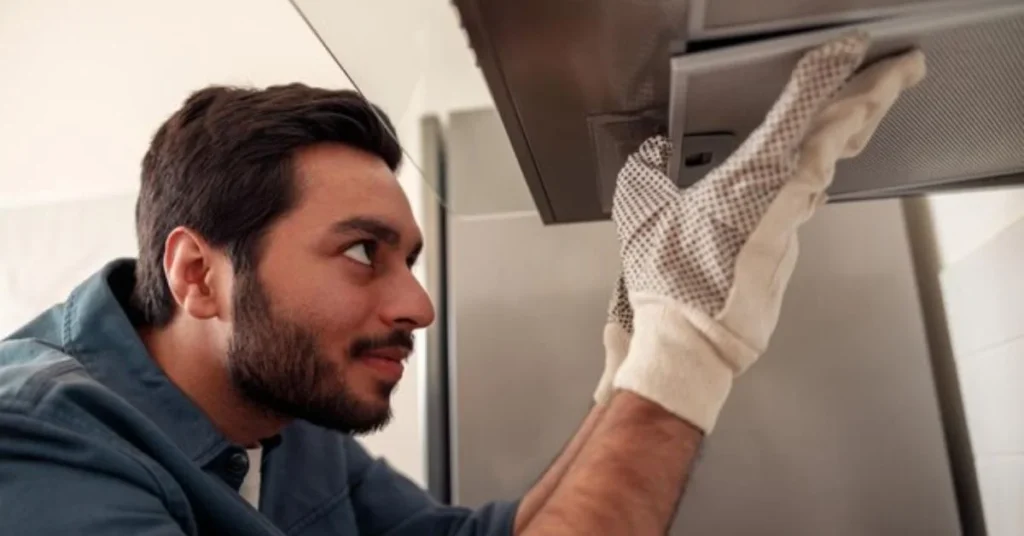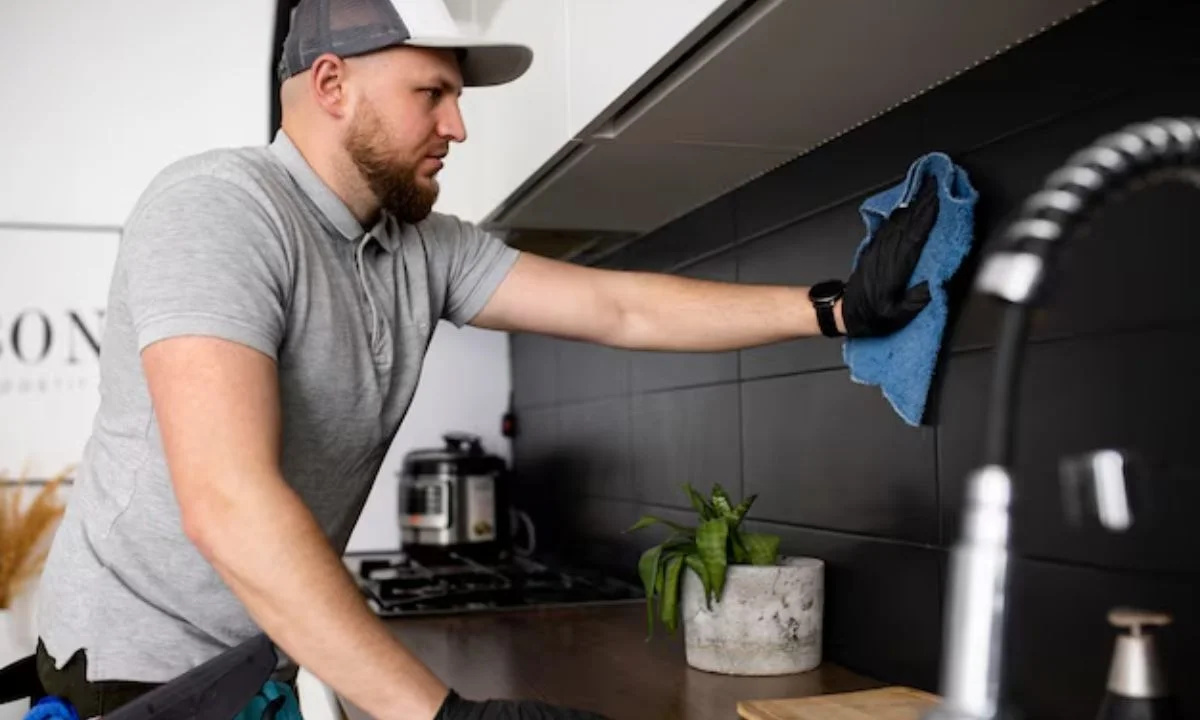Keeping your kitchen safe and running efficiently requires regular kitchen exhaust hood cleaning. Whether you cook daily or occasionally, grease, smoke, and food particles collect in the exhaust hood, posing a fire hazard and lowering air quality. If not cleaned frequently, these buildups can lead to dangerous conditions in your kitchen.
A clean kitchen exhaust hood improves air circulation, removes harmful odors, and prevents grease fires. In commercial kitchens, it’s essential to meet health and safety standards. Let’s explore why kitchen exhaust hood cleaning is so important, how often you should do it, and the best methods to ensure your kitchen is safe and clean.
How a Kitchen Exhaust Hood Works and Why It Needs Cleaning
Your kitchen exhaust hood plays a vital role in keeping the air in your kitchen clean and fresh. Positioned above your stove, it pulls in smoke, steam, grease, and food particles, preventing them from lingering in the air. It then filters these particles through a system of filters and ducts, sending cleaner air back into your kitchen or outside.
However, over time, the filters and ducts in the exhaust hood become clogged with grease and grime. This buildup can make the hood less effective at filtering air and removing smoke, and it can also create a fire hazard if not properly maintained. When grease accumulates in the filters or ducts, it can ignite, leading to a dangerous kitchen fire. Therefore, regular kitchen exhaust hood cleaning is essential for preventing these risks and keeping your kitchen running smoothly.
Must read Transform Your Backyard with an Outdoor Kitchen by the Above Ground Pool
How Often Should You Clean Your Kitchen Exhaust Hood?
The frequency of kitchen exhaust hood cleaning depends on how often you cook and the type of food you prepare. For home kitchens, it’s recommended to clean the exhaust hood at least once every three months. However, if you frequently fry foods or cook with oils, you may need to clean it more often.
In commercial kitchens, where heavy cooking is done daily, exhaust hoods should be cleaned much more regularly. Restaurants and other food service establishments are typically required by health and safety regulations to clean their exhaust hoods every month or even more frequently, depending on usage. Regular inspections by professionals can help determine the cleaning schedule needed to keep the exhaust hood in optimal condition.

Steps for Cleaning Your Kitchen Exhaust Hood
Cleaning a kitchen exhaust hood may seem intimidating, but with the right steps, it can be a manageable task. Below is a step-by-step guide to help you effectively clean your kitchen exhaust hood.
Turn Off the Power
Before you begin cleaning, ensure that the power to the exhaust hood is turned off. This is an important safety precaution to avoid electrical accidents.
Remove the Filters
Most exhaust hoods have metal mesh or baffle filters that can easily be removed. These filters are designed to trap grease and need to be cleaned regularly. Simply slide them out from the hood and place them in a sink filled with warm, soapy water.
Soak and Scrub the Filters
Let the filters soak in the soapy water for about 10 to 15 minutes. This will loosen the grease and grime. After soaking, use a soft brush or sponge to scrub the filters until they are free of grease. If the grease buildup is particularly stubborn, consider using a degreaser to help break it down.
Clean the Inside and Outside of the Hood
While the filters are soaking, take a damp cloth and wipe down the inside and outside of the exhaust hood. Pay special attention to any areas where grease has built up. You can also use a degreasing cleaner to help remove tough stains and grease from the hood’s surface.
Clean the Ducts
Cleaning the ducts is more challenging, as they run from the exhaust hood to the outside of the building. In most home kitchens, professional cleaning services may be required for the ductwork. However, if accessible, you can use a long brush to clean inside the ducts and remove grease buildup.
Reassemble the Exhaust Hood
Once everything is clean and dry, reassemble the exhaust hood by placing the filters back into position. Make sure everything is securely in place before turning the power back on.

Why Professional Cleaning Services May Be Necessary
While basic cleaning can be done at home, professional kitchen exhaust hood cleaning services are recommended, especially for commercial kitchens. These professionals have the tools and expertise to thoroughly clean the entire exhaust system, including the hard-to-reach ducts. They also help ensure that your kitchen meets local safety and health regulations.
For home kitchens, a professional cleaning service is not always necessary, but it can be a good option if you find that grease buildup is becoming difficult to manage or if you haven’t cleaned the exhaust hood in a long time.
Benefits of Regular Kitchen Exhaust Hood Cleaning
Regular kitchen exhaust hood cleaning offers a range of benefits for both home and commercial kitchens. Some of the key advantages include:
- Improved Air Quality: By removing grease, smoke, and food particles from the air, a clean exhaust hood helps keep the air in your kitchen fresh and healthy. This is especially important in busy kitchens where cooking odors can quickly accumulate.
- Fire Prevention: One of the most significant benefits of cleaning the exhaust hood is fire prevention. Grease buildup is highly flammable, and regular cleaning minimizes the risk of a grease fire.
- Increased Efficiency: A clean exhaust hood works more efficiently, removing smoke and steam from your kitchen more effectively. This helps maintain a comfortable cooking environment and prevents lingering odors.
- Compliance with Health and Safety Standards: For commercial kitchens, regular cleaning ensures that you remain in compliance with local health and safety regulations. It also reduces the risk of costly fines or business closures due to health violations.
- Extended Lifespan of Equipment: Properly maintaining your exhaust hood can extend its lifespan, reducing the need for expensive repairs or replacements.

Conclusion
Regular kitchen exhaust hood cleaning is essential for maintaining a safe and healthy kitchen. Whether you’re a home cook or run a commercial kitchen, cleaning the exhaust hood prevents grease fires, improves air quality, and ensures the efficiency of your equipment. While basic cleaning can be done at home, hiring professional cleaning services ensures a thorough job, especially for more complex ductwork.
By maintaining your kitchen exhaust hood, you’re taking an important step toward creating a safer cooking environment and prolonging the life of your equipment. Regular cleaning not only improves the overall hygiene of your kitchen but also helps keep it running efficiently for years to come.
For further reading on kitchen safety and cleaning techniques, check out these professional kitchen cleaning services.
Why is kitchen exhaust hood cleaning important?
Cleaning the exhaust hood is essential to prevent grease buildup, which can lead to fire hazards and poor air quality in the kitchen.
How often should I clean my kitchen exhaust hood?
For home kitchens, it’s recommended to clean the exhaust hood every three months. Commercial kitchens may need to clean their hoods more frequently, depending on usage.
Can I clean my kitchen exhaust hood myself?
Yes, you can clean your kitchen exhaust hood by following proper steps, but professional cleaning is advised for thorough maintenance, especially for commercial kitchens.
What happens if I don’t clean my kitchen exhaust hood?
Failing to clean the hood can lead to grease buildup, which can reduce air quality, create unpleasant odors, and increase the risk of grease fires.
Should I hire a professional to clean my kitchen exhaust hood?
While home kitchens may not always need professional cleaning, commercial kitchens and those with heavy grease buildup should consider hiring a professional service.
